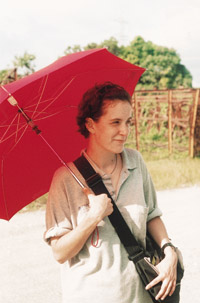 Interview
Interview
>>
Rachel Cole on living and learning in the Dominican Republic
For
fourth-year Rachel Cole, community service doesn't mean a few
hours when she can spare the time; she's spent nearly three
of her 23 years as a full-time volunteer. Last academic year
she taught at the Lechería migrant-worker camp,
or a batey, in the Dominican Republic, then stayed to help establish
the community's first library. Now Cole is at work on an honors
anthropology paper about the racism directed at the migrant
sugarcane workers in bateyes. Cole has a second concentration
in economics.
|
|
Rachel Cole, an umbrella as her sunblock, in a Dominican
batey.
|
What
was it like to live in the Dominican Republic?
I
went with a volunteer program called Response-Ability, run by
the Society of the Holy Child Jesus, a Catholic order of nuns,
and received room and board and about $100 a month stipend.
That was a lot more than my neighbors had. I lived in Los Alcarrizos,
a huge sprawling slum on the outskirts of Santo Domingo, and
my neighbors were Dominicans. We hitched rides to the batey
about two miles away. From September to June there were three
of us volunteers and two nuns. During the summer I stayed on
alone.
We
took turns cooking, so we ate a lot of standard U.S. cuisine.
We also had a lot of rice and beans, tostones (sort of
like french fries made from plantains), and mangu (mashed
yucca). We almost never had meat because we didn't trust our
weak gringo immune systems with the local meat, but I'm
a vegetarian anyways. Tropical fruit-pineapple, papaya, mango,
tamarind, avocados-was better and fresher than I'd ever had;
vegetables were fewer. The DR has the best beer in the world,
I think: Presidente. Because there were frequent power outages
the corner store kept some frozen so they would always have
unas frias (some cold ones) to sell.
There's
incredible unemployment and underemployment in the Dominican
Republic, and it's a really stratified society. In sugarcane
production, for five months of the year the work is very intense,
so companies import workers from Haiti to cut the sugarcane;
they live in the batey. The rest of the year is tiempo
muerto-dead time. There's no work. Some go back to Haiti,
but many stay and build families.
Did
the children you taught have any access to books at all?
It
was a really print-poor environment. Beyond not having books
in their houses-if anyone had a book, it would be the Bible-there
weren't newspapers or signs, because no one can read.
We
taught only nursery school and first grade. We wanted to encourage
individual learning, to get kids to love to read. It's a completely
different idea of learning than they'll encounter in the public
schools, which use phonics devoid of meaning. The kids get bored
right away. I made sure all my students were enrolled in the
public school before I left, but the classes had 60 to 70 students
in them. Can you imagine teaching 70 seven-year-olds, half of
them sharing chairs, to read in an echo-y concrete room?
Over
the summer I ran a library. It was absolutely perplexing to
the kids that I would let them come in and not tell them what
to do. By the end of the summer, I thought they were getting
it. You have to change the culture, the kids' attitude toward
learning.
What
will the library be like?
Our
school had a lot of books, but we wanted a separate building
in the batey. After I left they brought in an old shipping
container and renovated it into a library, putting in windows
and a door and a cement patio with tables and benches in the
back. It will be a lot sturdier than my students' houses. As
long as the kids can keep it straight that this is a biblioteca
and not a discoteca, everything should be okay.
What
form does the racism you describe in your B.A. paper take?
Dominicans
are all colors, but on average they're lighter than Haitians.
Lighter people tend to be richer, darker people tend to be poorer.
One argument is that Dominican racism against darker people
is largely in response to trying to keep sovereignty. Haiti
is seen as a savage place, much more densely populated and much
poorer, but at the same time the DR and Haiti are one island,
and there's incredible intermixing.
The
bateyes are perfect places to study the racism, because
they're so isolated from the rest of Dominican society. Some
bateyes have their own police forces to keep workers
from running away. The Haitians' situation in the DR has been
compared to modern slavery.

![]()
 Interview
Interview